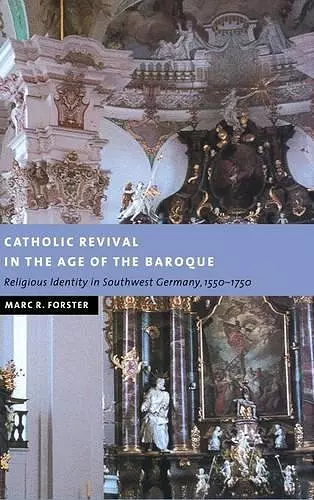Catholic Revival in the Age of the Baroque
Religious Identity in Southwest Germany, 1550–1750
Format:Hardback
Publisher:Cambridge University Press
Published:5th Feb '01
Currently unavailable, and unfortunately no date known when it will be back
This hardback is available in another edition too:
- Paperback£51.00(9780521036924)

A study of 'Catholic identity' in southwest Germany in the two centuries after the Reformation.
Many studies of the subject of 'Catholic identity' seek to credit rulers and Church leaders with creating and enforcing religious identity in Germany 'from above'. In contrast, this study argues that there were important and specific local and religious reasons why people came to consider themselves loyal Catholics.This book is a study of Catholic reform, popular Catholicism and the development of confessional identity in southwest Germany. Based on extensive archival study, it argues that Catholic confessional identity developed primarily from the identification of villagers and townspeople with the practices of Baroque Catholicism - particularly pilgrimages, processions, confraternities and the Mass. Thus the book is in part a critique of the confessionalization thesis which dominates scholarship in this field. The book is not however focused narrowly on the concerns of German historians. An analysis of popular religious practice and of the relationship between parishioners and the clergy in villages and small towns allows for a broader understanding of popular Catholicism, especially in the period after 1650. Local Baroque Catholicism was ultimately a successful convergence of popular and elite, lay and clerical elements, which led to an increasingly elaborate religious style.
'… an invaluable contribution to the history of Catholic revival in Germany and has profound implications for other areas of Europe as well.' Journal of Ecclesiastical History
'Forster's approach, in short, is a compelling one and has the added virtue of making the German experience more comparable with other parts of Catholic Europe.' English Historical Review
Forster's work illuminates central features of Baroque Catholicism and underlines the limitations of the theory of confessionalisation as a model of the development of early modern German society and the religious experience of its members.' Joachim Whaley, German History
'Forster's approach, in short, is a compelling one and has the added virtue of making the German experience more comparable with other parts of Catholic Europe.' Oxford Academic Journals
'… a vivid and nuanced picture of the relations between secular rulers, the Catholic clergy, and their blocks … the book makes a wonderful introduction to the religious history of eighteenth-century Europe.' The Historical Journal
'… a significant contribution to the specialist literatures on German and religious history.' Religious Studies Review
ISBN: 9780521780445
Dimensions: 229mm x 152mm x 19mm
Weight: 590g
284 pages